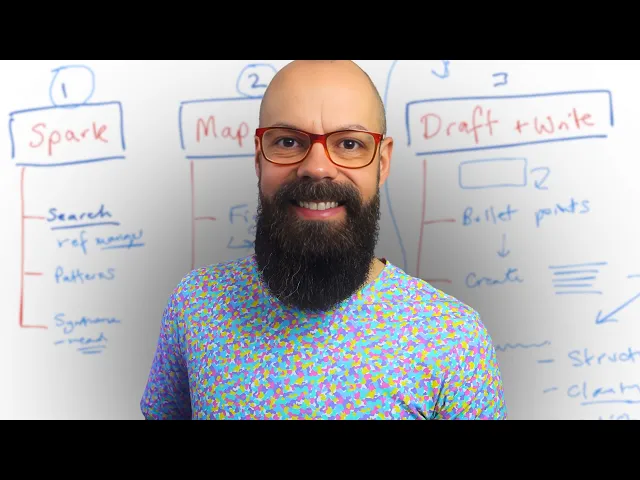My 3-Part Workflow to Stand Out In Academia (Keep it simple)

# My 3-Part Workflow to Stand Out In Academia (Keep it Simple)
Struggling to publish faster, stand out in your academic field, or feeling perpetually behind on your research? Working harder isn’t always the answer. Many academics waste time on activities that don’t move their research forward. In this post, I’ll share the three essential workflows that can help minimize distractions, maximize output, and ensure you stand out in academia.
## Workflow 1: SPARK – Generate Ideas Continuously
When you’re feeling lost or disconnected from your field’s cutting edge, this workflow helps reignite your creativity:
1. **Search** for research ideas around your main topic
– Use tools like Google Scholar, Open Alex, or AI tools like Elicit to get summaries of top papers
– Run searches regularly to stay current with leading-edge research
2. **Save** everything to your reference manager
– Use Zotero, Mendeley, or EndNote to organize your findings
3. **Synthesize** to find patterns
– Read abstracts to understand each paper
– Use tools like Notebook LM to chat with your reference list and identify patterns
– Delve deeper into individual papers that spark your interest
**Pro tip:** Run this workflow whenever you feel uninspired. As a bonus, mentioning recently read papers in supervisor meetings (“I was reading an interesting paper recently…”) makes you stand out as a valuable source of information.
## Workflow 2: MAP AND FRAME – Turn Data into Stories
Once you have data, this workflow helps transform it into compelling research narratives:
1. **Create figures** from your data
– Do this immediately after collecting data, not “later”
– Each figure should tell a clear story that you can explain to others
2. **Analyze and draw conclusions** from each figure
3. **Build research stories** by combining multiple figures
– Structure each story around:
– The problem you’re solving
– The evidence you’ve provided (through your figures)
– The outcome or impact of your findings
4. **Tell people** about your research regularly
– Present at departmental symposia or research group meetings
– Speaking your research aloud helps identify gaps and solidify your narrative
**Remember:** Don’t
Recent Videos
How To Earn MONEY With Images (No Bullsh*t)
Smart earnings from your image collection In today's digital economy, passive income streams have become increasingly accessible to creators with various skill sets. A recent YouTube video cuts through the hype to explore legitimate ways photographers, designers, and even casual smartphone users can monetize their image collections. The strategies outlined don't rely on unrealistic promises or complicated schemes—instead, they focus on established marketplaces with proven revenue potential for image creators. Key Points Stock photography platforms like Shutterstock, Adobe Stock, and Getty Images remain viable income sources when you understand their specific requirements and optimize your submissions accordingly. Specialized marketplaces focusing...
Oct 3, 2025New SHAPE SHIFTING AI Robot Is Freaking People Out
Liquid robots will change everything In the quiet labs of Carnegie Mellon University, scientists have created something that feels plucked from science fiction—a magnetic slime robot that can transform between liquid and solid states, slipping through tight spaces before reassembling on the other side. This technology, showcased in a recent YouTube video, represents a significant leap beyond traditional robotics into a realm where machines mimic not just animal movements, but their fundamental physical properties. While the internet might be buzzing with dystopian concerns about "shape-shifting terminators," the reality offers far more promising applications that could revolutionize medicine, rescue operations, and...
Oct 3, 2025How To Do Homeless AI Tiktok Trend (Tiktok Homeless AI Tutorial)
AI homeless trend raises ethical concerns In an era where social media trends evolve faster than we can comprehend them, TikTok's "homeless AI" trend has sparked both creative engagement and serious ethical questions. The trend, which involves using AI to transform ordinary photos into images depicting homelessness, has rapidly gained traction across the platform, with creators eagerly jumping on board to showcase their digital transformations. While the technical process is relatively straightforward, the implications of digitally "becoming homeless" for entertainment deserve careful consideration. The video tutorial provides a step-by-step guide on creating these AI-generated images, explaining how users can transform...
